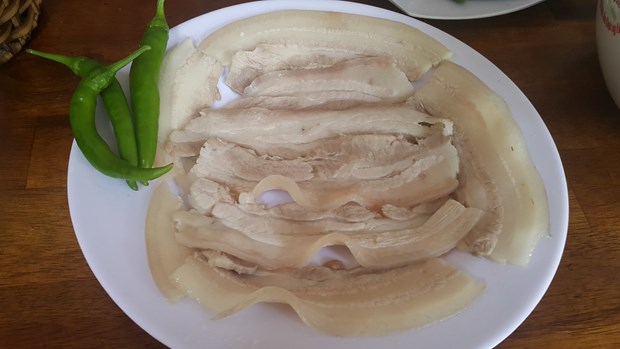Ms. Quang Viet, a local resident shared: “This restaurant has best pork dishes in Da Nang”. Located at 165-167 Nui Thanh street, Dai Loc restaurant was our first destination after our flight from Saigon on October 26th, 2016.

At Dai Loc restaurant, these pork slices are certainly not lean.
Our
plan was to have a bowl of “Mi Quang” then heading to Hoi An. However, Ms. Viet
persuaded us to try the Dai Loc pork. Then, we ordered a small portion for each
person.
Definitely,
it was the most premium pork that I have ever tasted. We almost missed the
“good start” of our journey.
Haiz!
Originally from the suburbs areas, that piece of pork, gathered all 4 “virtues”
including a balanced distribution of fat and lean, tasty smell, and
characteristics of good quality belly pork. That was different from the lean
kind of pork that Dai Loc was advertising: the amount of fat was not too much
and had an opalescent color.
The
pork dish recalled us about the local accent and the sceneries of Dai Loc.
The
pig might be home grown and fed with bananas. Thus, there was not much fat in
the meat.
The
delicious Dai Loc pork reminded me of the story told by my two female
colleagues about a pig at Chuon village, Hue. During their business trip in
“Holy Kingdom”, the two were treated with some pork dish by local people.
Savoring
the dish, they couldn’t stop complimenting: what a delicious piece of pork! How
did you raise it? The host teased: “The
pork is good because it cannot read newspapers!”
The
two journalists laughed while felt a little bit embarrassed. According to his
theory, Dai Loc pig cannot read print newspapers and even online newspapers…
A
portion of pork dish contained 8 pieces of pork cut in thin and medium slices
with the length of 12 – 13 cm. If there were only pork, the dish would be
imperfect. Therefore, it needed three “musts”.
Ms.
Viet asked and learned that everyone at the table could eat seasoning sauce.
Each local pork restaurant here has its own recipes of preparing seasoning
sauce. The sauce has a tasty smell along with some anchovy fish.
The
seasoning sauce contained both dissolved fish and dissolving dish, which were
salted a week apart. The most important thing stayed at how the sauce didn’t
contain preservatives. Hence, seasoning sauce is the first “must”.
Local
chilly with its signature greenish color has a special spicy flavor similarly
to the jealousy between Hoan and Kieu in a Vietnamese classic poetry.
However,
I felt that the spicy taste was not as strong as in the past. May be the
species is no longer authentic. Dai Loc has its famous Bau Tron vegetable,
similarly to Tra Que vegetable from Hoi An. Veggies and chilly are the second
“must”.
Rice
noodle and rice paper wrappers are the third “must”. Wrappers had to be thin
not as thick as the overrated one from Dai Loc. May be due to the fact that we
have rice noodle wrappers.
At
the first glance, I was wondering why they rolled pork with rice noodle
wrappers. Each wrapper was cut in wide shape and has the same length as the
pork slices (around 5 cm).
Ms.
Viet explained by her local accent: “Rice noodle wrappers were cooked with “Mi
Quang”; people will cut them into strands when they were enlarged and hot.
Then,
we were explained how to split the rice noodle wrappers. Instead of using
hands, place and press the round rice paper wrapper on the rice noodle wrapper.
Then, pull the rice paper wrapper; it would separate the rice noodle wrappers
as thin as the “Mi Quang” noodle. It was true that we always needed learn how
to eat properly.
Dai
Loc pork was one of the best kinds that I have ever had. When being a kid, I
used to have homemade pork during Tet holiday but I almost forgot the taste.
However,
we were not guarantee that Que Xua has the best pork dish in Da Nang because we
did not have a chance to try other restaurants.
Writer: Ngu Yen/TGTT
Translator: Thu Pham